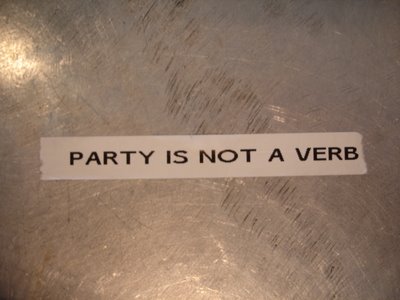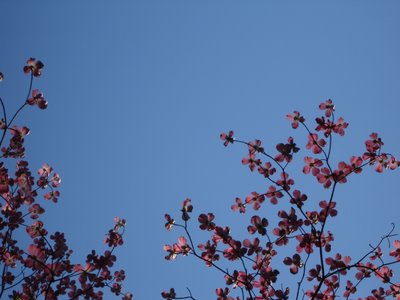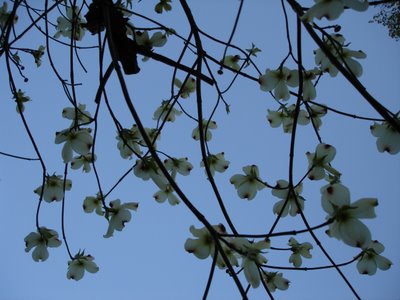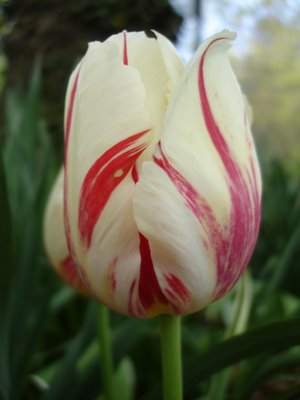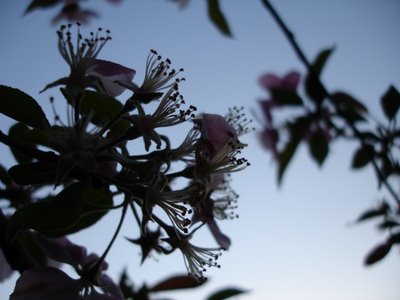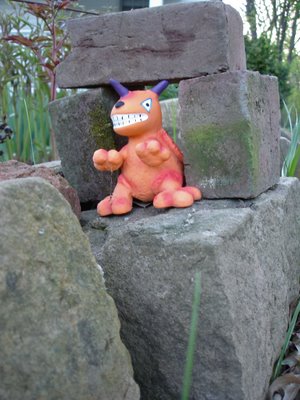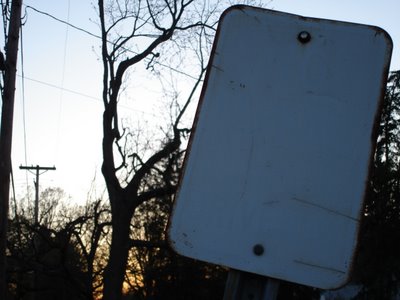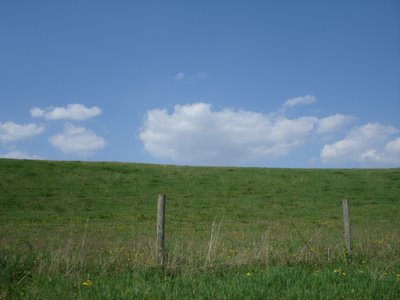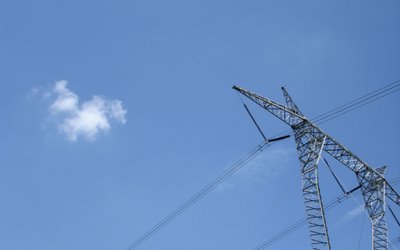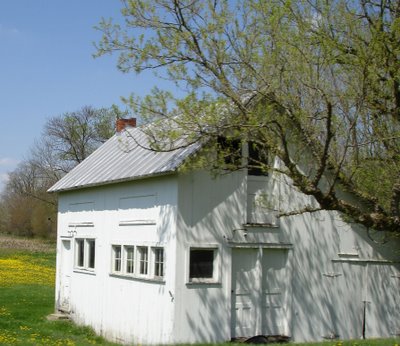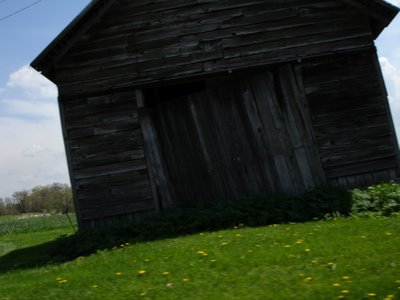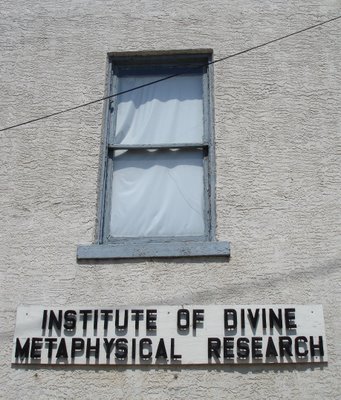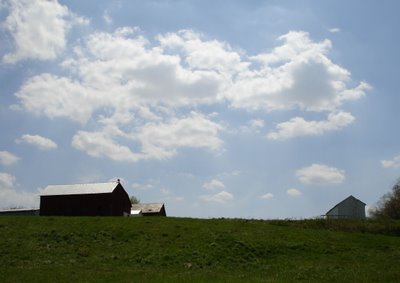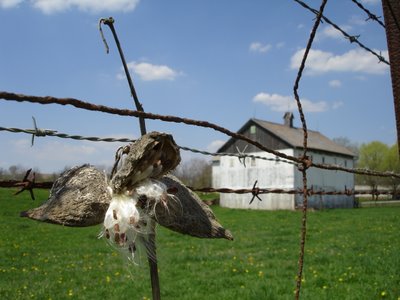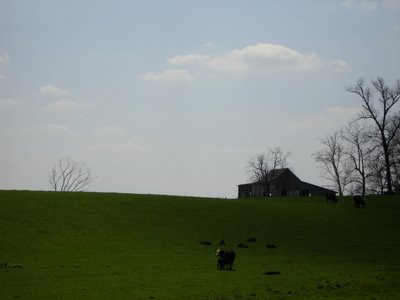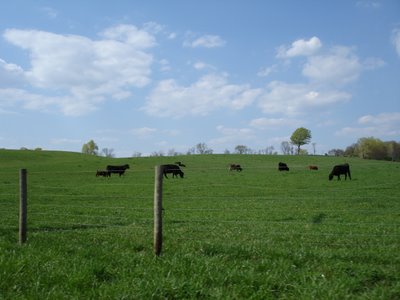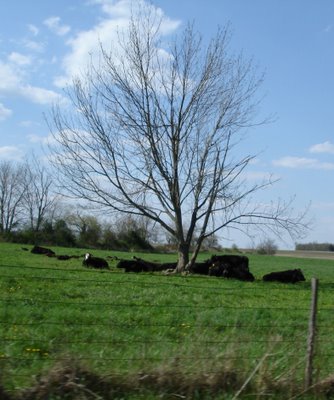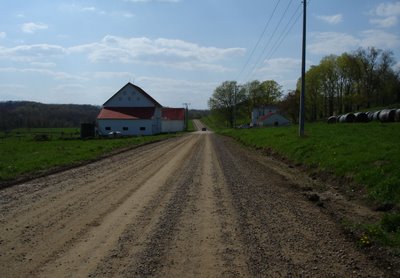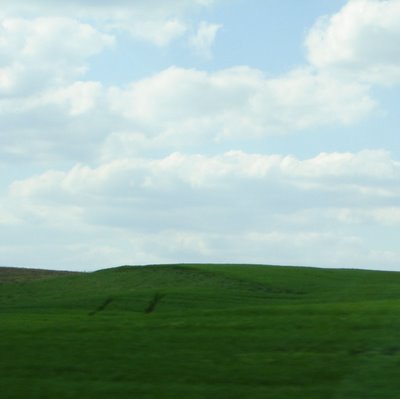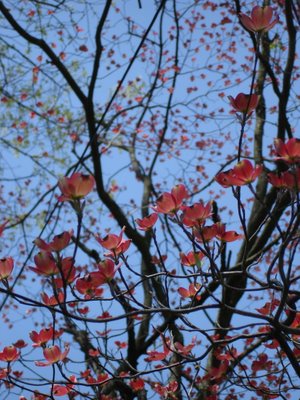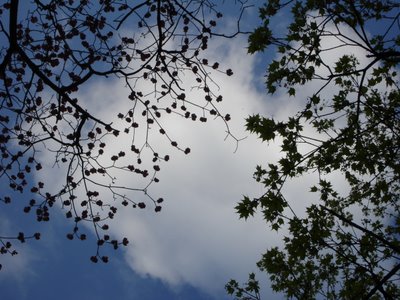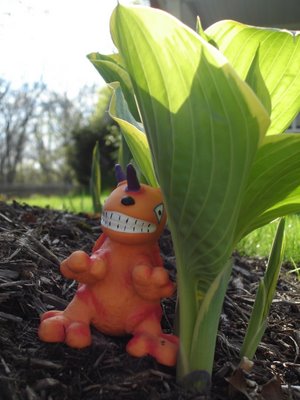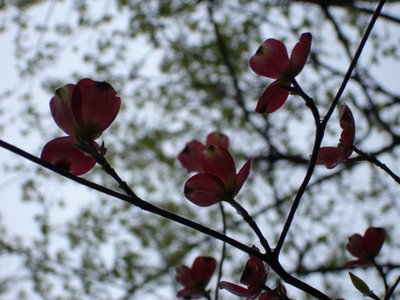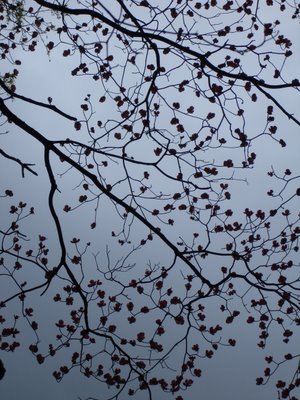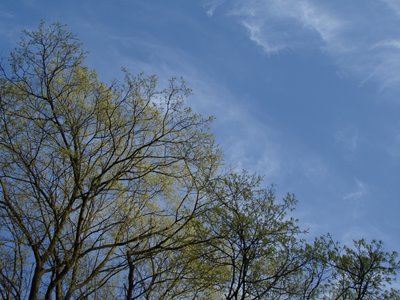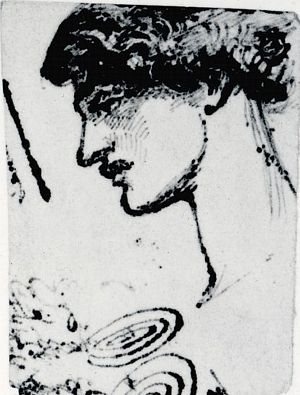An embodiment of the phrase "populous solitude."
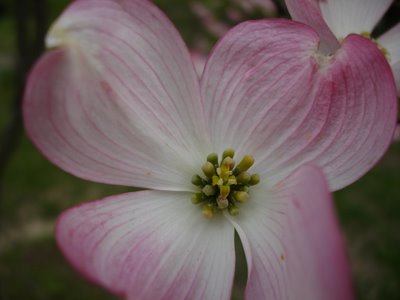
One of my least favorite facets of this spring has been falling far out of contact with so many people I love. Among these, perhaps the most surprising has been my beloved Brooklynite, to whom I wrote daily for many years, and for whom I now seem not to be able to make more than a message a week happen. (There are others; many of you are among my readers, and I hope you know the depth of my regret and the strength of my resolve that the second I slam out the other side of the long tunnel called second semester, I will start being a better correspondent--or, let's not fool ourselves, any kind of correspondent--again.)
Today I am thinking about my dearth of writing to darling ER (giggle, blush) because it is her birthday. I don't know how she's celebrating, but I hope that this message will help bring a beautiful day to a close. I hope, that is, that her birthday has been a beautiful one, the only kind she deserves.
I met ER (and no, those of you who know who she is, those aren't her real initials--they're her nickname's initials, silly) in summer 2001, when we were both doing research in England, I in London and she at Oxford's Lincoln College. Her brother, whom I knew through friends in Ithaca, said, "You and my sister would get along. She's in England, too. You should contact her." I remember nodding but thinking it probably wouldn't happen. But then ER e-mailed me, just after I touched down in South Kensington, and said, "You should come to visit." And so I did. And thank goodness I did.
We hit it off immediately, immediately enough that when I had concluded the second part of my research (in Edinburgh's National Library of Scotland) I stopped back through Oxford on my way to Gatwick to catch my flight home. By that time, ER's husband was visiting, and the three of us went out on the town for pizza in a restaurant housed in a medieval building, then tripped around the strange ancient alleyways of Oxford, in the half-dusk of a July evening. Almost immediately upon both of our returns to the U.S., we were writing daily, and she became my mainstay, my anchor, so smart and so funny and so wickedly hip and so devoted to literature and to teaching and so understanding of my ever-increasing weirdnesses (because my dissertation was just starting to heat up, and I still haven't worked out all the strange kinks that project got into my system).
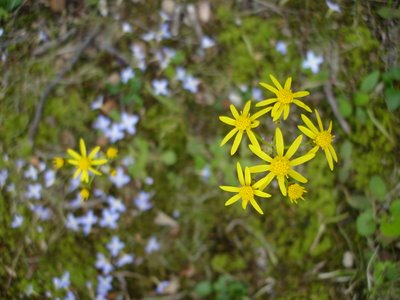
On 9/11, she was the second person I thought of when the students from the class after mine started filing in, as I was erasing the chalkboard from my 8:40 a.m. Frankenstein lesson, and said, "Did you hear what happened?" (The first person I thought of: my father, who was in Mexico on business.) I remember writing to her the next day, "I realize that I don't even know enough about your social life to know whom you were able to call and be with." (Her husband, on his way to work when everything happened, didn't make it home from Manhattan until the next day.) A couple of days later, the packet of Frankenstein cartoons she had mailed that Monday arrived, Gary Larson's humor seeming even blacker than usual, the fat envelope feeling like a dispatch from a different universe.
By October, she was helping me develop my skills with making pie crusts and apple pie fillings. She was there when I had my first and only (touch wood) fender bender. She stuck by me, tough and bolstering and indignant and worried, when I sank and sank that fall, sank until things started to look very dire indeed. She was there to be overjoyed when I made some inexplicable turn for the better that winter.
I visited her in Brooklyn for the first time the next spring. I remember the excitement of the Manhattan Bridge crossing, the excitement of seeing her again after months and months, the excitement of exchanging gifts. I remember sitting across from her at the dining room table in the old apartment, facing the front door, the low bookshelf/divider behind me, and thinking, "It's like I just stepped out yesterday and then came back today; it's like I've been seeing her every day for months."
I then remember taking the Q back to Manhattan and going to the Stage Deli for dinner with her in-laws and her husband, and then I remember sitting on the sidewalk outside the Ziegfield waiting for three hours to see the second Star Wars movie. She and her sister-in-law were choosing color palettes from a book. I remember this so clearly: I sat facing 54th Street, hardly suspecting that in six months I would be staring down disconsolately at that stretch of sidewalk, watching from my hotel room as the Academic Mayhem utterly passed me by.
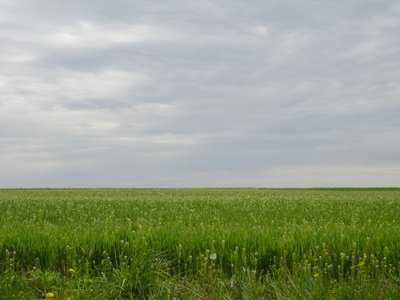
During that wretched few days in December, she helped keep me up. By that time, we had had not only the funny joys of the spring and summer (that was the year we acquired our matched set of pewter tadpoles, signs of so much transition ongoing, so much to come) but also the detonations of unexpected small tragedies in our lives--curious, careless neglect by people meant to be careful and thoughtful with us; inexplicably ambiguous treatment by people we thought were well-suited to us; unutterably swift onsets of ill pet health, followed by stealthy, sudden death and most poignant burial. We had held each other up with, among other things, a late-November photo-ramble through the Brooklyn Museum and the Brooklyn Botanic Gardens (where I hope she went this weekend for the cherry blossom festival to which she introduced me). In my pictures from that trip, she is elfin, with a penumbra of sunlight. I can see how everything I looked at through the camera looked different because she was there, because we were happy and together. I took extreme close-ups of the roses that, strangely, were still blooming in November; she told me later that they were obscene, because we had read about someone's castigation of obscene flowers. We marveled at the truly bizarre sculptural scrapyard (replete with a scaled-down replica of the Statue of Liberty) lying at the edge of the parking lot. We kept wandering and looking until the daylight faded altogether, and then we wandered and looked our way home to the apartment they'd bought that summer, around the corner from the old place. We cooked dinner, as always. We watched the Sopranos, as usual. The three of us sat on the couch and read together, as ever.
During the Academic Mayhem, things were rockier again, and it was ER who showed up in her black cashmere turtleneck ("I got it on sale," she said. "It was ridiculously cheap") and said to me, you're allowed to be angry. You can swear if you need to. I swore and cried and swore, and then we strolled out onto the Avenue of the Americas and wove through the tourists and eventually caught up with her husband and ate Cuban food and watched The Hours. And it didn't make the Mayhem go away, but it reminded me that there was more to life than the Mayhem, and that there was more to me than the Mayhem.
By the next fall, so much had changed again: the dissertation finished and filed, the first job accepted and moved into, the second round of job applications coming together and heading out to try to win my fortune. A love stammeringly begun and ridiculously terminated. A career of sharpening and honing into muscle and bone, into an interviewing and teaching machine, begun. By this point, my pewter tadpole was paired with a blue-green glass frog, the gift she'd handed me the morning I braced myself for one final two-hour push on the dissertation, having sat up with it all through the night, trying to comb out all the typos and rough spots. The frog fits perfectly in my closed fist, in a way that comforts and calms beyond explanation, its nose presenting itself for meditative rubbing. The frog is in all of the pictures from my Ph.D. ceremony that next spring, because by then ER couldn't travel.

Just as I started toughening and hardening, she started softening and expanding. "I am, as you would say, growing a person," she e-mailed me one Sunday evening, and I yelped and whooped and exclaimed, finally knowing what it would feel like to find out that someone my own age was going to make a small child the luckiest, most loved person who'd ever lived. When I visited her that fall, carrying a red business suit smaller than anything I'd ever worn before, she was starting to wonder whether people could tell yet that she was expecting. Her weight was just shifting, her bustline expanding, her hips getting ready to widen. She couldn't walk very quickly, and I was embarrassed to have to be reminded, aloud, of how quickly she started feeling fatigue. At our favorite breakfast place, she needed -- needed -- oatmeal immediately -- immediately! -- and ate it, and ate half a waffle, and then barely made it home before the baby started snarfing and she needed to sleep. She kept sleeping and eating, eating and sleeping, and I kept marvelling at how much her body had just started doing its own thing, working on growing the baby without any apparent control on her part.
Her son was the first person who actually looked to me like a person in ultrasound pictures. My mother said, "Does that make you think differently about being pro-choice?" I said, "No. It makes it incredibly more sad to me to think of how impossible that decision must be when people need to make it, and how cruel it is to believe that people go into that choice thoughtlessly." I thought of the arrow pointing to the baby's head. "He already has such a big brain," they said. "We're very excited." (I have not yet mentioned that ER and her husband have the driest, best wit.)
By February, we knew he was a boy. Their plan had always been to have two kids, a boy and a girl. The boy would be named Thumbs. The girl would be named Kinky. I knew she wouldn't tell me the baby's real name. I bestowed a different name on him every day until he was born. My first suggestion was Samuel.
When I saw her again in April, for our birthdays, Thumbs was big enough that I could feel him kick, big enough that he bounced along as we laughed watching Mean Girls, big enough that going to the cherry blossom festival and then having ice cream in the sun knocked her down for hours, so that the apartment was a den of hot, crashed people (plus one hot, crashed cat). We cooked dinner, as always. We watched the Sopranos and, now, Buffy the Vampire Slayer, as usual. We read together on the couch, as ever.
Samuel was born in mid-June, just as I was preparing to move back to Gambier. It turned out they had already decided on the name even before I started gifting him monikers in the late winter. Because of him I learned the suffix of endearment -eleh; we call him Sameleh. He has been a wondrous, splendiferous child since birth, and I hate that I am only a legendary auntie for him, a literary-godmother-in-waiting, a giver of tiny striped socks he doesn't remember (though also of The Foot Book, which I hope he still loves). His parents posted pictures of him once a month for the first year of his life, and so I could fantasize a sense that I knew how he was developing--what stages he'd reached, what foods he liked, what he thought about, whom he favored. I watched his face molding into his father's and his mother's at the same time. I found myself startled by the strength of my feeling for him and by the fierceness of my admiration for his mother. I find myself startled now, as I type, by the fact that in this paragraph she has become his mother; even at the level of my prose, she is no longer simply herself. She is always Sameleh's mother.
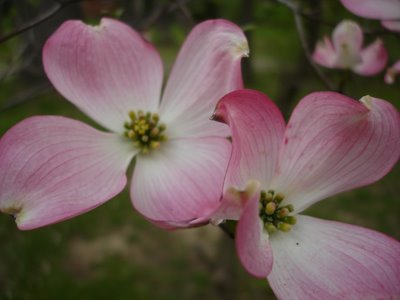
And yet--and this is why he is an incredibly lucky child--she is also, and always, a reader, a thinker, a teacher, a baker, a meditative quick spirit, a slow steady conscience, a creator, an instigator, a beauty, a scholar. One of my favorite pictures from the last time I was able to make the trip to Brooklyn, in October, is of her walking away from me with Sameleh, who'd just started walking, on her hip. She's exactly the same friend of mine she's been since that first moment in July 2001, and I, behind the camera, am exactly the same friend of hers I've been since that same moment. But now there's a small person balanced on her hip, holding in his hand the strange seed-pod he's picked up from the ground, and we're all three heading over to play on the slide, and then we'll watch the geese, and then we'll go home. And, a day's career of stacking blocks and running down the hall to slam doors brought to an end, the baby will go to bed with his nighttime rituals--the bath, the massage, the song from his mother and father, all a reassurance that the same love will be there when he opens his eyes again in the dark. And, the baby safely asleep, we will cook dinner, as always. We will watch a tiny bit of TV, as usual. We will read together, as ever. And I'll know, when I really ask myself for the truth--even when I worry or doubt that it might not be true, that my silence might alienate her or that her life might be too busy for me--that the next time I push the buzzer at their Brooklyn building and make my way to their floor, I'll hear the bolts slipping back and see the cat coming to greet me and hear my elfin friend's voice, all the same as if it hadn't been eight months since our last visit, saying, "You made it!"
Happy birthday, darling. Don't let that baby forget me altogether. Don't you forget me altogether, either, please.

